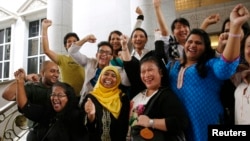A Malaysian court on Friday gave transgender Muslims the right to cross-dress in a landmark decision overturning an Islamic sharia law ban that could trigger similar challenges.
Muslim-majority Malaysia represents itself as the global face of moderate Islam, but at home it has experienced a gradual Islamisation that makes minority groups worry their rights could lose out in a clash between sharia law and the constitution.
Several cases challenging Malaysia's religious law in civil courts have been quashed in recent years, despite guarantees in the constitution on the freedom of expression, religion and gender equality.
Contravened constitution
On Friday, the Court of Appeal said the law against cross-dressing by Muslim men contravened the country's constitution and did not take account of male Muslims affected by gender identity disorder.
The law and its punishments were “degrading, oppressive and inhuman”, the three judges added.
Rights group Human Rights Watch has listed Malaysia as one of the worst countries in which to be a transgender person, due to systematic abuses by religious authorities and police.
Activists welcomed Friday's ruling.
“Now the transgender community know they have their rights to challenge the law and not just plead guilty to charges,” said Nisha Ayub of Justice for Sisters, an LGBT group.
The prosecution declined to say if it would file an appeal in the country's highest court, the Federal Court.
Transgenders launched lawsuit
The case was launched by four transgender individuals in the western state of Negeri Sembilan, three of whom went in appeal against a lower court's decision in 2012.
“This is a win for all Malaysians, as the constitution protects us all, irrespective of ethnicity, gender and class,” said Ivy Josiah of the Women's Aid Organization.
“Surely no court, civil or sharia, can refute the fact that human dignity is paramount,” Josiah told Reuters.
Religion is a sensitive topic for the Malaysian government.
Ethnic Malays, who are Muslim, make up 60 percent of a population of roughly 29 million. Chinese account for more than a quarter and ethnic Indians form a substantial minority. Christians account for about 9 percent.
Last year, Malaysia's highest court ruled that a Catholic newspaper may not use the word “Allah,” the Arabic word for “God,” for Malay-speaking congregants.
Bibles confiscated
Police and religious authorities drew fire this year for bold moves that involved confiscating Bibles that used the word “Allah” to ignoring court orders about child custody between Muslim and non-Muslim couples.
Last month, the country's attorney general said a Muslim activist's call to burn Bibles with the word “Allah” was not seditious and its aim “was only to defend the purity of Islam.”
Friday's decision is a precedent for transgender individuals to challenge the Islamic sharia ban in other Malaysian states, said Aston Paiva, the lawyer for the petitioners.
“The state law is still there and they can still continue to make arrests, but you can now go to the high court and challenge this,” Paiva told reporters, as the state law has yet to be repealed.










